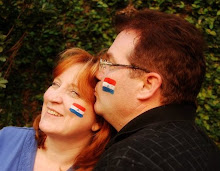
Jayde wearing her traditional Ye'kwana face paint.
When you live in a small, closed community, such as an indian village, it is easy to lose touch with the larger world. The universe contracts and becomes the space you occupy and the people you see daily.
As an outsider and an adult, I still found this would happen to me occasionally, but for my children it could become normal for them to think the world revolved around our little village. The other villages along our river were 'foreign' like other countries even, and town, where Spanish was spoken, was down right alien. The strangest of all would be the 'gringo' people who would appear in our world from time to time.
Once, when my youngest daughter was but a toddler, we found ourselves in the village for a longer stretch than normal. We had not left the village in over 6 months and in the mind of a toddler, that was forever.

About that time a North American man and his grown son decided to fly out and visit us. When they arrived we were quite happy to visit and chat with them in English. They stayed with us for several days and were very kind and generous to our children. They had brought them coveted books and goodies from the US, so the kids were thrilled to have them as visitors.
Except for the baby.
She seemed very upset the first few days. Although normally a bubbly, out going child, she withdrew and became shy, even rude to the guests. After one meal where she refused to speak with the gentlemen, I had to take her aside and try to figure out her problem.
She began to cry and informed me that these men were speaking 'our' language! How did they know 'our' language? They we not 'our' family! Who had taught them to talk like us? Of course, this was all expressed in the vocabulary of a 3 and a half year old.
I was floored! My blond, blue eyed child thought that our family alone spoke the English language! She felt threatened that strangers, who looked a lot like us, could waltz into her life and communicate intimately with us in our family's private language! Her entire world view had been shaken, she was insecure in who she was and where she fit into the big picture.
Because of this, we learned that we had to make an effort to leave the village fairly often, every two to three months, and spend a few weeks out of the jungle and away from the tribe so that the children would not get over whelmed with the outside world. Even so, we still had times when the children would come up with something that totally blew our minds as parents.
Such as when I was teaching my daughter about the US flag and that each state was represented by its own star. She wanted to know which star represented our village.
Another daughter was learning map skills and I was called away for a few moments. I handed her a piece of chalk and asked her to draw a map of the world while I was out. Our school room had untreated cement floors, so I used the floor as a work space for the kids to do their drawings, spelling words, and even math drills.
When I returned, she had covered the floor with an amazingly accurate map of the world.
Her world.
In other words, the village.

The World







3 comments:
I always find it amazing how a child's mind works. Having Cami to raise brings back all the memories of the things my children would say and do. It is their own little world they live in. I love to read the stories of what your children would say and do. It gives a different perspective on how children view the world compared to us "adults". Keep writing Rita. I love it and look forward to reading this everyday.
I can vividly remember looking down at my skin and being startled at its whiteness. One benefit to having your world that small is the safety. I still yearn for the sense of closeness and community we felt on Luaniua Island.
Love this blog!!! Just beautiful!!!!
Post a Comment